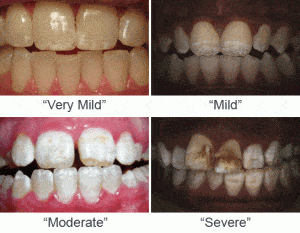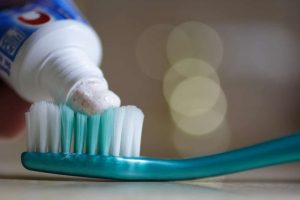The United States government has recommended a lower level of fluoride in drinking water for the first time in 50 years.
The Department of Health and Human Services (DHHS) has suggested that public water supplies contain between 0.7 and 1.2 milligrams of fluoride per liter since 1962. However, on Monday, DHHS made an announcement that they now recommend that fluoride not exceed 0.7 milligrams per liter. The new recommendation has been in the works since 2011.

Two-thirds of American water utilities add fluoride to drinking water in an effort to reduce cavities. However, because fluoride is now found in so many other sources, including toothpastes and fluoride rinses, many people are receiving too much fluoride, which can result in fluorosis. Fluorosis causes tooth staining, from mild cases which produce white spots, to severe cases which produce brown spots and mottled teeth. Today, 41% of adolescents between the ages of 12 and 15 have some degree of fluorosis, and the number is rising. When the initial fluoride recommendation was made in 1962, fluoride was found in far fewer sources.
Fluoridation of water has come under fire recently, with experts weighing in on both sides of the argument. Deputy Surgeon General Rear Admiral Dr. Boris Lushniak supports fluoridation. “Community water fluoridation continues to reduce tooth decay in children and adults beyond that provided by using only toothpaste and other fluoride-containing products,” he commented.

But Dr. Philippe Grandjean, an environmental health researcher and physician at Harvard University, disagrees, stating that there has been insufficient research in recent years to support the benefits of widespread fluoridation. “We need to revisit those benefits to make sure that the old reports are still valid for the current fluoride exposure situation,” Grandjean stated.
Dr. Grandjean is one of a growing group who advocates only using fluoride topically, and to avoid swallowing it. He notes that fluoride produces the bulk of its benefits topically, and that ingestion exposes the internal organs to unnecessary chemical burden. Recent studies have suggested a possible link between drinking water fluoridation and ADHD, as well as hypothyroidism. Some Chinese studies have even suggested a link between high fluoride levels in drinking water and reduced IQ.
“I’d say it’s a reasonable concern that fluoride can affect brain development,” Grandjean says. “Lowering the recommended fluoridation level to 0.7 mg per liter is very well-justified. I would in fact recommend that the level be reduced even further,” stated Dr. Grandjean, adding that cavities have declined at similar rates in countries with and without public drinking water fluoridation.
